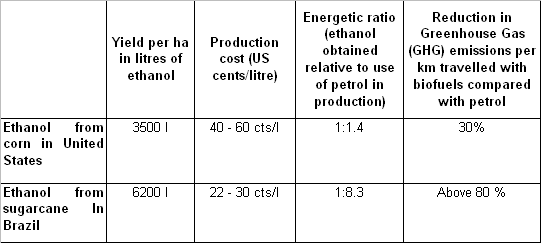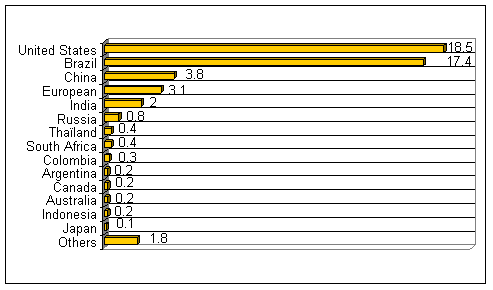 Geneva, 27 April 2007 - With current oil prices substantially above those of the past and growing concern about global warming, policymakers and the public are more interested in finding alternatives to petrol than at any time since the mid-1970s. Biofuels - fuels derived from biomass - can offer a promising supplement, especially as a fuel for transport and for power generation.
Geneva, 27 April 2007 - With current oil prices substantially above those of the past and growing concern about global warming, policymakers and the public are more interested in finding alternatives to petrol than at any time since the mid-1970s. Biofuels - fuels derived from biomass - can offer a promising supplement, especially as a fuel for transport and for power generation.
Biofuels production is based on agricultural production and therefore many countries can produce them easily. Moreover, there are several additional benefits: reduction of oil import bills, better energy security and diversification of energy sources, diversification of agricultural output, accelerated development of rural areas, increased rural employment, and the possibility to raise export earnings.
However, not all agricultural countries are best suited to produce biofuels. The economic viability of biofuels production depends on crop yields and the efficiency of the processing. The following table compares ethanol from corn (maize) in the United States with ethanol from sugarcane in Brazil (see table 1).
As seen from the table, producing ethanol from sugarcane is far more efficient than producing it from corn, both from the economic point of view and for achieving the greatest reduction of GHG emissions. The reason is that there is much more solar energy available for the plants in the tropics than in a temperate climate. Lower labour costs in developing countries such as Brazil widen the difference further. As stated by Mr. Claude Mandil, head of the International Energy Agency "the [corn and wheat] methods [to produce ethanol] are the worst imaginable, because they are only commercially viable with permanent subsidies and trade barriers, and their production requires a large amount of fossil fuels inputs, which is not the case for ethanol produced from sugar cane and other tropical biofuels."(1)
Developing countries have a clear competitive advantage in producing biofuels. Accordingly, it would be more efficient if biofuels were produced in developing countries and traded in an open and non distorted market. However, biofuels producers receive subsidies in developed countries and are protected by high import tariffs and other non-tariff barriers. The resulting limitation on market size makes it less attractive to invest in biofuels production in developing countries and risks delaying commercially viable production of biofuels. This in turn also means that action against global warming is less effective than it could be.
While biofuels production using present processes in developed countries is not economically viable without subsidies and barriers to imports, biofuels production in developing countries (or more specifically in tropical countries) offers interesting economic opportunities. However, there are also some concerns. These relate mainly to environmental issues such as deforestation (clearing virgin forest may be uneconomic and also results in the release of large amounts of carbon), worsening of water scarcity and loss of biodiversity. It is also argued that higher food prices resulting from competition over land between food and energy crops may raise issues of food security. While these issues are important, proper policies can limit their impacts. For instance, some tropical plants are well suited to be cultivated on degraded lands, which are not currently used for agricultural purposes. This is the case for the Jatropha tree, which yields nuts whose oil can be turned into biodiesel. Grown on degraded land, it does not interact with forests nor enter into competition with food production. Proper management of land can limit the extension of agricultural land and preserve primary forests. It should be mentioned that there is much more land available for biofuels production in developing countries, particularly Africa, than in developed countries. At present, this land is not cultivated because of lack of capital for equipment and inputs and lack of markets for products. The creation of standards and certification schemes well adapted to the circumstances of developing countries may help in establishing rules to protect the environment and, certified products could attract a price premium to compensate for the extra effort made to comply with standards.
Biofuel production in tropical countries can provide concrete and important benefits to rural communities, increase access to energy, reduce energy dependency and benefit climate change mitigation. However, current production and investment plans do not seem to follow the more logical path of promoting production in tropical countries (see figure 1).
ANNEX
Table and Figure
Table 1: Comparison between ethanol from corn in the United States and ethanol from sugarcane in Brazil
Source: Biofuels for transport, IEA, 2004.
Figure 1: Production of ethanol in 2006 in billion litres
Source: Les Echos, 8 March 2007, p7.


